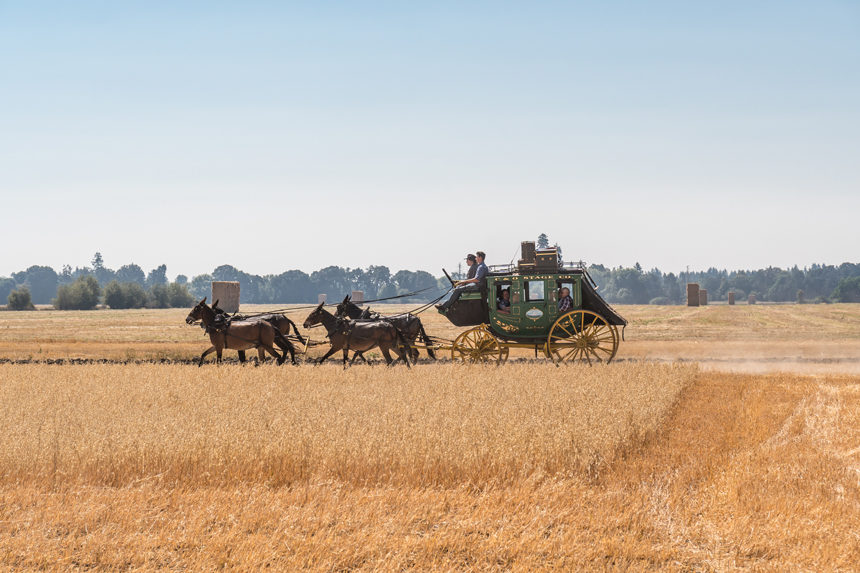Managing editor and logophile Andy Hollandbeck reveals the sometimes surprising roots of common English words and phrases. Remember: Etymology tells us where a word comes from, but not what it means today.
There are quite a few common English words that derive from the names of places where they were first invented, created, or discovered. Many of them are rather obvious: If you’ve ever worn a suede fez and sipped cognac while your pet chihuahua rests on your Capri pants — and who hasn’t? — then you’ve got a lot of experience with this sort of thing.
But others aren’t so obvious. Both denim and jeans, for example, derive their names from where they were first produced and distributed (in this case, France and Italy, respectively). And so does a word common to both sports and transportation: coach. Its story goes back to the 16th century.
During the early and mid-1500s until his death in 1564, Ferdinand I, in a series of overlapping geopolitical shifts, was the Archduke of Austria; the King of Hungary, of Croatia, and of Bohemia; and the Emperor of the Holy Roman Empire. With such vast lands under his sway, many nobles had to travel great, uncomfortable distances to conduct business with him.
Meanwhile, carriage-makers in the town of Kocs, Hungary, had developed and were producing a type of carriage that had more comfortable seating for passengers and that was larger than your standard carriage — so the rough, unpaved roads felt less jarring. In Hungarian, this carriage was called Kocsi szekér (literally a “carriage of Kocs”), and it became very popular across Europe in the mid-1500s, especially among the rich nobles who could afford one. In fairly short order, and in many languages, the name Kocsi szekér was shortened to just Kocsi.
The cs at the end of Kocs, it should be noted, is pronounced like a ch in English, a pronunciation that would be reflected as the word was adapted to other European languages. In German, it was called kotsche; in Dutch, koets; in Italian, cocchino; in Spanish and Portuguese, coche. And in French, whence it entered English around 1550, it was also coche, though pronounced differently than in Spanish and Portuguese. And this, of course, became our Modern English word coach.
As often happens in English, this noun also became a verb. By 1610, to coach meant to convey a person in a coach, in the same way that one might boat to an island or bike to the corner store for the latest issue of Vintage Accordions Monthly. Strangely (in my opinion), according to the written record, it took more than two centuries for a figurative sense to catch on.
In the 1830s at Oxford University, coach became a slang term for a tutor or instructor: As a literal coach carried a passenger to their physical destination, a metaphorical coach “carried” a student through their exams. By the 1850s, these types of coaches were more regularly coaching students to help them improve their grades. This type of coach and coaching over time transferred to other disciplines, and especially to sports. For example, if you wanted to become a jockey, you’d start by finding a riding coach.
Which leads us into modern times. If you were riding in a Kocsi szekér in the 16th century, you were in the lap of luxury. But that comfort became, first, an expectation, and then practically a denigration. In the 1860s, coach was applied to passenger cars on trains. Comfortable, yes, but not with a lot of frills. And this basic, no-frills passenger service transferred to a class of seating on commercial airlines in the mid-20th century.
In the 1950s, you could typically had two options for flying: a coach-class seat or a standard-class or first-class seat. What began as the most luxurious and comfortable arrangement for long-distance traveling had become the most basic, cheapest, least lavish option. Today, the airlines have expanded the spectrum of their offerings, and coach has all but disappeared in favor of class names like economy, business, business-plus, business-select, premium, and premium-select. First-class seating is still around, too.
You will still find coach seating on passenger trains, though that form of transportation isn’t so popular anymore. But regardless, whether your coach is on a plane, a train, a horse track, or the dusty plains of the Old West, the name for it traces back to a small town in Hungary.
Become a Saturday Evening Post member and enjoy unlimited access. Subscribe now




Comments
An interesting Hungarian connection largely unusual overall. I like how you explained the unlikely connection of how ‘coach’ came to be transportation and teaching terms both, and remain so to this day rarely (if ever) being confused with one another. “Coach” was also one of the funnier sitcoms during the 90’s, I feel.